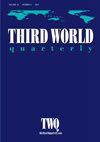Rescuing reconciliation: finding its role in peace research and practice
IF 1.8
2区 经济学
Q2 DEVELOPMENT STUDIES
引用次数: 1
Abstract
Abstract A rich and complex literature on reconciliation has emerged in response to political transitions since the 1990s, yet reconciliation’s value as a concept within peace studies is unclear. Definitions are contested, impressionistic or overlap with other concepts, while ‘reconciliation’ remains politically contested in many conflict-affected societies. This article considers the four leading understandings of reconciliation: reconciliation as peacebuilding, reconciliation as transitional justice, reconciliation as forgiveness, and reconciliation as identity change. Each is assessed according to whether it is (1) conceptually coherent, and (2) likely to be credible to people in conflict. The article argues that by restricting reconciliation’s meaning to a modified version of the fourth understanding – reconciliation as transformed social identity – the term can hold a distinct meaning in the peace studies field and direct a clear research agenda, as well as attract much less political criticism and misunderstanding.拯救和解:寻找其在和平研究与实践中的作用
摘要自20世纪90年代以来,随着政治转型,出现了丰富而复杂的和解文献,但和解作为和平研究中的一个概念的价值尚不明确。定义存在争议、印象主义或与其他概念重叠,而“和解”在许多受冲突影响的社会中仍然存在政治争议。本文认为,对和解的四种主要理解是:和解是建设和平,和解是过渡时期的正义,和解是宽恕,和解是身份改变。每一个都是根据它是否(1)在概念上连贯,以及(2)对冲突中的人来说可能可信来评估的。文章认为,通过将和解的含义限制在第四种理解的修改版本中——和解是一种转变的社会身份——这个词可以在和平研究领域具有独特的含义,指导明确的研究议程,并减少政治批评和误解。
本文章由计算机程序翻译,如有差异,请以英文原文为准。
求助全文
约1分钟内获得全文
求助全文
来源期刊

Third World Quarterly
DEVELOPMENT STUDIES-
CiteScore
4.10
自引率
15.00%
发文量
137
期刊介绍:
Third World Quarterly ( TWQ ) is the leading journal of scholarship and policy in the field of international studies. For almost four decades it has set the agenda of the global debate on development discourses. As the most influential academic journal covering the emerging worlds, TWQ is at the forefront of analysis and commentary on fundamental issues of global concern. TWQ examines all the issues that affect the many Third Worlds and is not averse to publishing provocative and exploratory articles, especially if they have the merit of opening up emerging areas of research that have not been given sufficient attention. TWQ is a peer-reviewed journal that looks beyond strict "development studies", providing an alternative and over-arching reflective analysis of micro-economic and grassroot efforts of development practitioners and planners. It furnishes expert insight into crucial issues before they impinge upon global media attention. TWQ acts as an almanac linking the academic terrains of the various contemporary area studies - African, Asian, Latin American and Middle Eastern - in an interdisciplinary manner with the publication of informative, innovative and investigative articles. Contributions are rigorously assessed by regional experts.
 求助内容:
求助内容: 应助结果提醒方式:
应助结果提醒方式:


